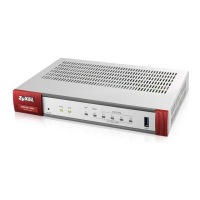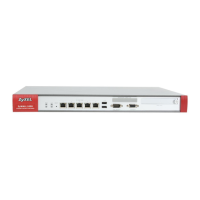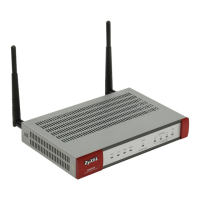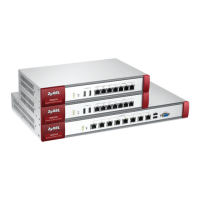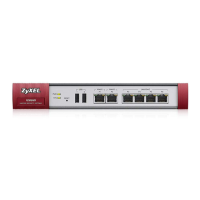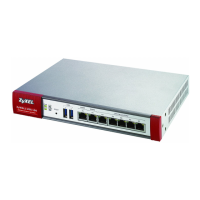Chapter 29 IPSec VPN
ZyWALL/USG Series User’s Guide
552
Pre-Shared Key Select this to have the ZyWALL/USG and remote IPSec router use a pre-shared key
(password) to identify each other when they negotiate the IKE SA. Type the pre-shared
key in the field to the right. The pre-shared key can be:
• alphanumeric characters or ,;.|`~!@#$%^&*()_+\{}':./<>=-"
• pairs of hexadecimal (0-9, A-F) characters, preceded by “0x”.
Type “0x” at the beginning of a hexadecimal key. For example,
"0x0123456789ABCDEF" is in hexadecimal format; “0123456789ABCDEF” is in ASCII
format. If you use hexadecimal, you must enter twice as many characters since you
need to enter pairs.
The ZyWALL/USG and remote IPSec router must use the same pre-shared key.
Select unmasked to see the pre-shared key in readable plain text.
Certificate Select this to have the ZyWALL/USG and remote IPSec router use certificates to
authenticate each other when they negotiate the IKE SA. Then select the certificate the
ZyWALL/USG uses to identify itself to the remote IPsec router.
This certificate is one of the certificates in My Certificates. If this certificate is self-
signed, import it into the remote IPsec router. If this certificate is signed by a CA, the
remote IPsec router must trust that CA.
Note: The IPSec routers must trust each other’s certificates.
The ZyWALL/USG uses one of its Trusted Certificates to authenticate the remote
IPSec router’s certificate. The trusted certificate can be a self-signed certificate or that
of a trusted CA that signed the remote IPSec router’s certificate.
User-based PSK User-based PSK (IKEv1 only) generates and manages separate pre-shared keys for
every user. This enables multiple users, each with a unique key, to access the same
VPN gateway policy with one-to-one authentication and strong encryption. Access can
be denied on a per-user basis thus allowing VPN SA user-based policies. Click User-
Based PSK then select a user or group object who is allowed VPN SA access using this
VPN gateway policy. This is for IKEv1 only.
Local ID Type This field is read-only if the ZyWALL/USG and remote IPSec router use certificates to
identify each other. Select which type of identification is used to identify the ZyWALL/
USG during authentication. Choices are:
IPv4 or IPv6 - the ZyWALL/USG is identified by an IP address
DNS - the ZyWALL/USG is identified by a domain name
E-mail - the ZyWALL/USG is identified by the string specified in this field
Content This field is read-only if the ZyWALL/USG and remote IPSec router use certificates to
identify each other. Type the identity of the ZyWALL/USG during authentication. The
identity depends on the Local ID Type.
IP - type an IP address; if you type 0.0.0.0, the ZyWALL/USG uses the IP address
specified in the My Address field. This is not recommended in the following situations:
• There is a NAT router between the ZyWALL/USG and remote IPSec router.
• You want the remote IPSec router to be able to distinguish between IPSec SA
requests that come from IPSec routers with dynamic WAN IP addresses.
In these situations, use a different IP address, or use a different Local ID Type.
DNS - type the fully qualified domain name (FQDN). This value is only used for
identification and can be any string that matches the peer ID string.
E-mail - the ZyWALL/USG is identified by the string you specify here; you can use up
to 63 ASCII characters including spaces, although trailing spaces are truncated. This
value is only used for identification and can be any string.
Table 211 Configuration > VPN > IPSec VPN > VPN Gateway > Add/Edit (continued)
LABEL DESCRIPTION

